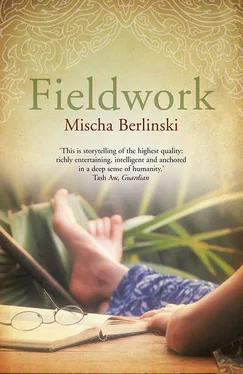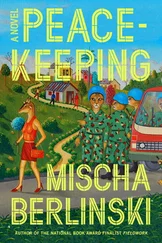The long evenings were not preceded by thrilling days. The Walkers chafed under the daily routine prescribed by Dr. and Mrs. Chester. It was hardly the high drama of saving souls that they had hoped for. Every morning, Raymond and Laura studied the Chinese language for two hours and the Tibetan for another two. This, they admitted, was a necessary duty, and after two years of study, Dr. Chester decided that both members of the couple were competent to deliver their first sermons. Laura chose to preach on "Sin, Salvation, and God's Love," Raymond on "Christian Prayer and Values." Laura had worked hard all her life, but here in Bantang, domestic affairs occupied far less of her time than she was used to, for the Mission employed a number of Chinese and Tibetan helpers who, having given up their families to gain their souls, needed employment, which the tender-hearted Chesters could not refuse them. This legion of servants occupied themselves with the daily household chores — with the goats (the Mission had a flock of over one hundred) and the chickens, the cooking, the clothes, the cleaning, and drawing fresh water from the well. In the afternoons, Laura accompanied Mrs. Chester on a round of the city's Christian charitable institutions: the small hospital, the orphanage, and the school. At the hospital, Laura sat by the bedside of the sick; at the orphanage, she introduced and led the games of her childhood, touch-tag and hide-and-seek; and at the school, she delivered every day a brief lesson on Christian living. These were assignments that she might have accepted happily were it not for Mrs. Chester's constant stream of advice. Laura was not the type of woman who frequently allowed herself the luxury of harsh thoughts, but she did admit shyly to her husband that when Mrs. Chester was stricken with a mild fever and spent three weeks in bed recuperating, the days had passed more easily.
One incident in particular set Laura against Mrs. Chester. It was the Walkers' second spring in Bantang, and on a day when the mountain air was remarkably clear and the sky a deep cobalt blue, Mrs. Chester, enchanted by the season, proposed to Laura that in place of their usual rounds, they visit a village some five or six miles from town where an old Christian woman lived, one of the first Chinese converts of the region. They set out in the early morning, but the village proved farther from Bantang than Mrs. Chester had recalled, and the two women did not arrive until well after noon. They took a long tea with the old Christian woman and did not set out on the road back until late afternoon.
Now, the roads around Bantang were generally safe by daylight but not without danger at night, and the two women walked quickly. They were halfway back to Bantang when they passed a small tribal woman crouched beside the road. The small woman made a cooing sound at them and smiled. Her teeth were stained black with betel nut, and her lips were the color of tar. The woman gestured at Mrs. Chester and Laura. She spoke to them in Chinese with a tribal accent as thick as Laura's midwestern drawl: "The wind has whispered me stories of the white folk in Bantang, but the wind has never told me what you do here."
Laura was not confident in her Chinese, and she deferred to Mrs. Chester, who explained that she and her husband had come from the white man's land across the endless seas to teach the people about Jesus, His Love, Sin, and Salvation.
The tribal woman, still squatting by the road, frowned. "Teach me, then," she said. "If you've come this far, I owe you my ears."
Mrs. Chester looked around. They were on a dark patch of road, and the sun was fast approaching the mountain horizon. There was still another hour's walk to the outskirts of town. Dr. Chester would be anxious. "We don't have the time to teach you just now," she said. "We must teach you another day."
The woman listened with a cocked head, then spat blood-red betel juice on the side of the road. "Don't tell me you've come all this way to teach me and then say you don't have time," she replied.
Mrs. Chester and Laura returned home safely that night. Laura recounted the incident to Raymond, and they agreed that Laura should find the tribal woman at once the next morning and explain the Gospel to her. But the next day the road was empty, and Laura couldn't help feeling that a woman of greater faith and integrity than herself would have insisted on teaching the woman by the side of the road, no matter the hour of day or night or the danger.
For his part, Raymond found himself relegated to a position as Dr. Chester's clerical assistant. Great volumes of mail from well-wishers and the inquisitive arrived by the weekly post for Dr. Chester, alerted to the work by his dispatches in National Geographic , and he would deposit these with Raymond, asking him to draft replies, so that Dr. Chester could continue work on his translation. Raymond prepared responses which ended either, depending on the formality of the communication and the intended audience: "Yours in the Hope of His Coming" (meant for well-wishers, general curious questions and requests, people with whom Dr. Chester did not have a close personal relationship); "Yours in the Service of Christ" (or, alternatively, "Yours in the Joy of His Service," meant for other missionaries and members of the clergy); or simply "Yours in Christ," a salutation which Dr. Chester felt appropriate to use only with the most intimate of his epistolary partners. At the end of the day, Raymond left the letters for Dr. Chester to sign. The Missionary Society required a lengthy written report every three months, and an accounting of the Mission Station's finances, and pounding these out on the Mission's portable typewriter was also made part of Raymond's responsibilities. Raymond was not a good typist. "Accounting is a part of evangelism," Dr. Chester said, seeing Raymond struggle with the books. "We pray for money to continue our work, and our Lord expects us to husband carefully His gifts." When Raymond took Dr. Chester aside after a year in Bantang and explained his desire to engage in a more active evangelism, Dr. Chester proposed that Raymond preach in the afternoons in front of the market. The market in Bantang was not a large one, and very quickly the traders in barley, sheep, yak meat, salt, and tea grew accustomed to the sight in the late afternoons of the lean, handsome American standing on a crate, stammering his way through an incomprehensible speech in poor Tibetan.
The most frustrating thing for the Walkers about their life in Bantang was that the size of the Christian community there held steady. Those who would be converted in this small city, it seemed, had been converted. Later in life, Raymond Walker would say that there was no better preparation for missionary life than to be assigned the task of tilling a stony mission field, but at the time the effort did not amuse him at all — the long wearisome unproductive days in which he wandered the streets of Bantang, cornering everyone who would listen. It bothered Raymond intensely that everywhere around him were souls to be won for Christ and that he did not possess the means to win them. Dr. Chester did not seem to care, or to realize the profound urgency of the moment.
One night Raymond had a dream. He was in a train station, and enormous queues of Chinamen streamed past him to board an old steam train. Raymond stopped one of them and asked him the destination of the train. The Chinaman, old and wizened, replied that it was the train to Hell. The destination was confirmed by the cry of a huge Negro porter: "Hell Express! All aboard!" Raymond tried to hold the old Chinaman back, but in his dream his limbs lost force and the man slithered easily from Raymond's hand. Raymond grasped at an old woman headed for the platform, and she, too, slipped from his hands and climbed aboard the train, which bulged with humanity, limbs protruding from the windows and doors. Then the terrible thing happened. In the great shuffling crowd, Raymond himself was swept aboard. "This is the train to Hell!" he cried. "Let me down!" But Raymond could not pass through the crowds, and he awoke in a sweat just before the train steamed out of the station.
Читать дальше












